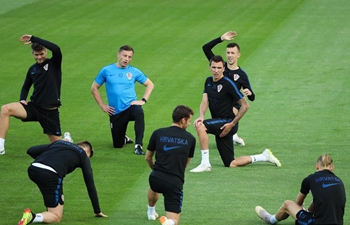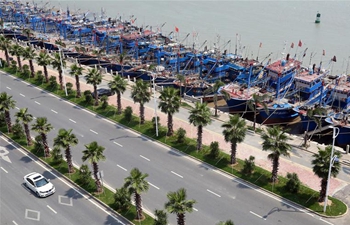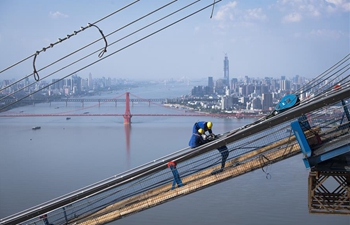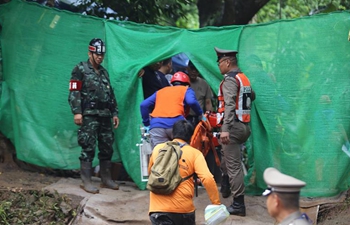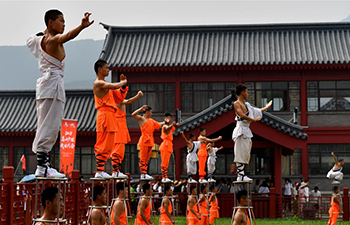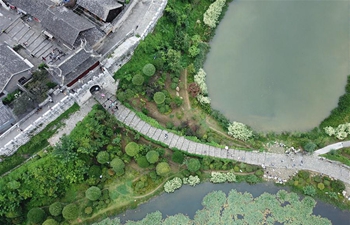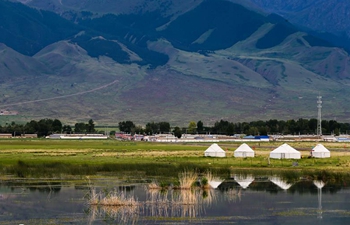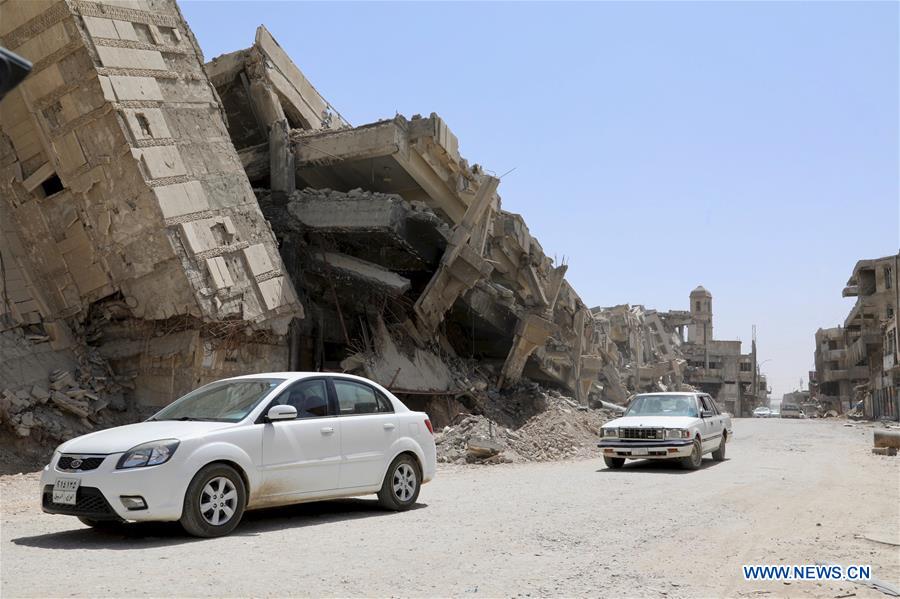
Photo taken on July 5, 2018 shows debris of the collapsed buildings in the old city of Mosul, Iraq. One year after the Iraqi forces liberated the city of Mosul from Islamic State (IS) militants, tens of thousands of displaced residents are still living in tents, suffering the scorching summer with a temperature of over 50 degrees Celsius. TO GO WITH Feature: One year on, tens of thousands of Iraqis remain displaced from homes in Mosul (Xinhua/Khalil Dawood)
MOSUL, Iraq, July 9 (Xinhua) -- One year after the Iraqi forces liberated the city of Mosul from Islamic State (IS) militants, tens of thousands of displaced residents are still living in tents, suffering the scorching summer with a temperature of over 50 degrees Celsius.
Abul Jabbar Mohammed, 62, a displaced old man from the town of Tal Afar, some 70 km west of Mosul, is squeezing his 23 family members into a 16-square-meter tent at Hassan Sham refugee camp, some 40 km east of Mosul.
The United Nations High Commissioner for Refugees (UNHCR) opened Hassan Sham refugee camp late in 2016 for people who were forced out of their homes in and around Mosul by the war against IS militants.
Mohammed failed to return home in Tal Afar, which he said is still unsecured, and his house was destroyed with no rehabilitation in place for his town, despite its liberation in August 2017.
Despite sufferings and inconveniences in the camp, Mohammed told Xinhua that "a tent in the camp is better than a palace at unsecured area with no public services."
Younis Dha-noon left his home with his family after his house was totally destroyed by the battles in the IS stronghold in the western side of Mosul.
"I wish I can return to my house, but it was totally destroyed. I hope the government would compensate me, so I can rebuild it and settle down after four years of displacement," Dha-noon said.
According to data provided by UNHCR, almost 1 million people fled the fighting in Mosul, with some 109,000 displaced people being distributed in camps south and east of Mosul, located some 400 km north of the Iraqi capital Baghdad.
There are also around 264,000 displaced people sheltering outside the camps, mostly in host communities in Erbil Province, the capital of the semi-autonomous Kurdistan region.
Botan Sallahaddin, 28, a manager of refugee camp operator Barzani Charity Foundation, told Xinhua that the camp is currently housing 1,172 families, with a total of 5,677 displaced persons in the Hassan Sham refugee camp.
He said the UN agencies provide some 70 kg of food to each family per month, which, for some big families, is sometimes not enough.
The agencies also provide 10 hours of electricity a day by generators. Sallahaddin said the camp at least provides safety and secure food and water.
Sallahaddin divided the displaced people into three categories: the first category includes those with their houses destroyed and no basic services available in their areas.
The second is those with houses located in disputed areas claimed by both the Iraqi central government and the Kurdish regional government.
The third involves families who have one or more members of IS militants, and fears retaliation by relatives of the victims killed or tortured by the IS.
The return of the displaced people to their hometowns is a huge challenge for the Iraqi government and the international humanitarian organizations, as the number of displaced people stood at over 3.4 million across Iraq during the peak of the crisis.
Jasim al-Attya, deputy minister of the Iraqi Ministry of Migration and Displaced, told Xinhua that "most of the displaced people have returned to their homes and all what we have is some 500,000 displaced people registered from the five provinces (Nineveh, Salahudin, Anbar, Diyala and Kirkuk) seized earlier by the IS."
Most of the displaced people, who did not return to their homes, are from Nineveh Province and its capital Mosul. The number of people who did not return home in Nineveh is around 220,000, Attya said.
Attya also said the Iraqi government has plans to remove the obstacles that prevent the displaced people from returning home, including the families of the extremist IS group and of those who cooperated with the terrorist organization.
"The Ministry of Migration and Displacement is working with the reconciliation committee formed earlier by the Council of Ministers (the cabinet) to integrate these families in the community again after being subjected to special programs," Attya added.
Attya admitted that the society rejects the families of IS militants, especially in the rural areas, where the tribes there believe in retaliation.
As for the displaced families in the disputed areas, "most of these families have returned home and only a few of them are still away from their homes, because the issue in these areas is of political nature that can be solved easier," Attya said.
Large parts of Iraq's northern province of Nineveh, including its capital Mosul, came under IS control since June 2014, when government forces abandoned their weapons and fled, enabling IS militants to take control of parts of Iraq's northern and western regions.
On July 10, 2017, Iraqi Prime Minister Haider al-Abadi declared full liberation of Mosul, the country's second largest city, from the IS after nearly nine months of fierce fighting to dislodge the extremist militants from their last major stronghold in Iraq.




